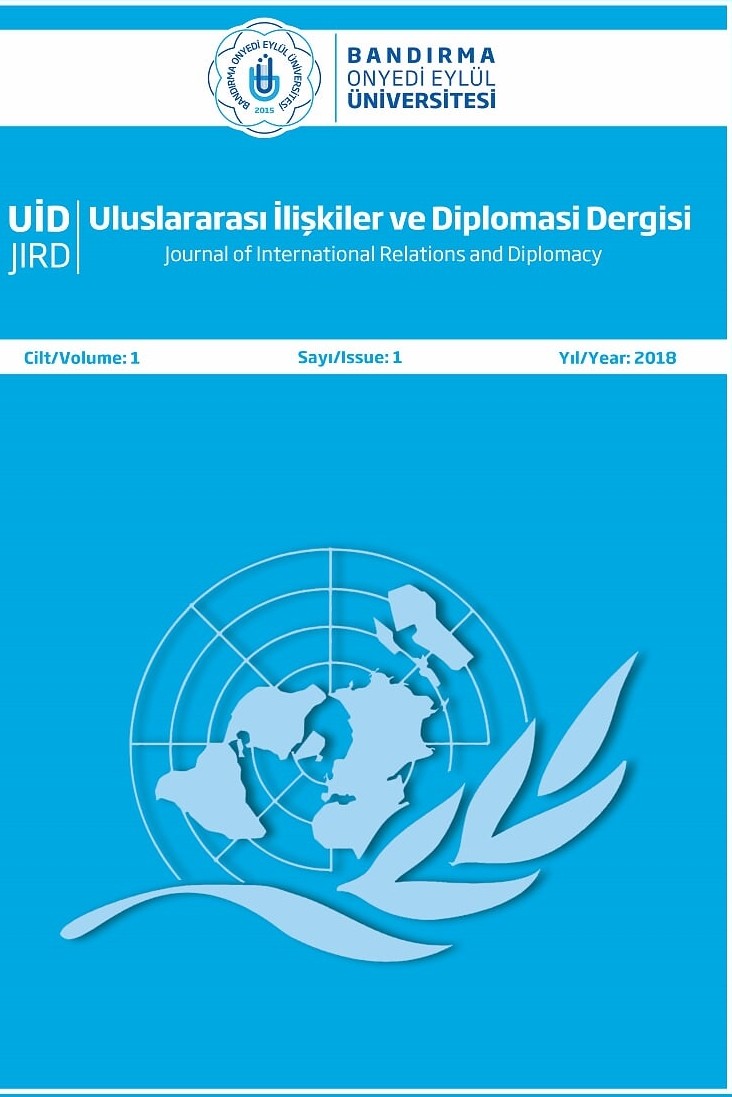TURKISH-AFRICAN RELATIONS: AN INSTITUTIONAL APPROACH OF TURKISH FOREIGN POLICY TOWARDS AFRICA
Foreign Policy, Institutionalism, Structured
___
- BibliographyAkpınar, P. (2013). Turkey's Peacebuilding in Somalia: The Limits of Humanitarian Diplomacy. Turkish Studies, 14(4), Ali, A. (2014). Turkey's Foray into Africa: A New Humanitarian Power?. Insight Turkey, 13(4), Daily Sabah (2019) Turkey's Maarif Foundation flourishes worldwide with new graduates; Retrieved from https://www.dailysabah.com/politics/2019/07/08/turkeys-maarif-foundation-flourishes-worldwide-with-new-graduates accessed on July 31, 2019. DEIK (2019) African-Business Councils; Retrieved from https://www.deik.org.tr/business-councils accessed on July 14, 2019. Genç, S., & Tekin, O. (2014). Turkey’s Increased Engagement in Africa: The Potential, Limits and Future Perspective of Relations. European Journal of Economic and Political Studies, 7(1).Ikenberry, G. J. (2009). Liberal internationalism 3.0: America and the dilemmas of liberal world order. Perspectives on Politics, 7(01)Kizilay, (2019) Turkish Red Crescent lending helping hand for 150 years. Retrieved from https://www.aa.com.tr/en/life/turkish-red-crescent-lending-helping-hand-for-150-years/1444773 accessed on 7/15/19 accessed on July 17, 2019Langan, M. (2017). Virtuous power Turkey in sub-Saharan Africa: the ‘Neo-Ottoman’challenge to the European Union. Third World Quarterly, 38(6), Mitrany, D. (1971). The functional approach in historical perspective. International Affairs (Royal Institute of International Affairs 1944-), 47(3), MUSIAD (2018) International Relations Commission; Retrieved from http://www.musiad.org.tr/en/foreign-relations/international-relations accessed on July 14, 2019MUSIAD (2019) Foreign Organizational Development Commission; Retrieved from http://www.musiad.org.tr/en/foreign-relations/foreign-organizational-development-commission-fodc accessed on July 14, 2019Njuafac, T. A., & Katman, F. (2016). Main Dynamics of Turkish-African Relations in the 21st Century. European researcher. Series A, (11) Önis, Z. (2011). Multiple Faces of the" New" Turkish Foreign Policy: Underlying Dynamics and a Critique. Insight Turkey, 13(1),Ozerdem, A. (2019). Turkey as an emerging global humanitarian and peacebuilding actor. In The Routledge Handbook of Turkish Politics (pp. 470-480). Routledge.Ozkan, M. (2010). Turkey's rising role in Africa. http://turkishpolicy.com/Files/ArticlePDF/turkeys-rising-role-in-africa-winter-2010-en.pdf accessed on June 3rd 2017Ozkan, M. (2013). Does “rising power” mean “rising donor”? Turkey's development aid in Africa. Africa Review, 5(2), 139-147.Ozkan, M., & Orakci, S. (2015). Turkey as a “political” actor in Africa–an assessment of Turkish involvement in Somalia, Journal of Eastern African Studies, 9(2), 343-352.Putnam, R. D., Haftendorn, H., & Tuschhoff, C. (1993) Two-level games: The impact of domestic politics on transatlantic bargaining. America and Europe in an Era of Change.Republic of Turkey Ministry of Foreign Affair –RTMFA (2019) African Union - Turkey Partnership Joint Implementation Report, Retrieved from http://www.mfa.gov.tr/african-union---turkey-partnership-joint-implementation-report_-2015-2017_-12-february-2018_en.en.mfa Accessed on July 16, 2019Republic of Turkey Ministry of Foreign Affairs-RTMFA (2017) Turkey-Africa Relations, Retrieved from http://www.mfa.gov.tr/turkey-africa-relations.en.mfa accessed on May 20, 2017 Rhodes, R. A., Binder, S. A., & Rockman, B. A. (2008) The Oxford handbook of political institutions, Oxford University PressShepsle, K. A. (2006) Rational choice institutionalism. The Oxford handbook of political institutions, Siradag, A. (2013). The making of the new Turkish foreign and security policy towards Africa-the rationale, roots and dynamics, Africa Insight, 43(1), Sıradağ, A. (2018). Turkey-Africa alliance: Evolving patterns in security relations. African Security Review, 27(3-4), 308-325.Thiessen, C., & Özerdem, A. (2019). Turkey in Somalia: challenging North/Western interventionism? Third World Quarterly, 1-21.TIKA (2017) Turkish Development Assistance Report, Retrieved from https://www.tika.gov.tr/upload/publication/Kalkinma2017EngWeb.pdf accessed on July 15, 2019.TIKA (2019) Turkish Development Assistance Report, Retrieved from http://www.tika.gov.tr/en accessed on July 15, 2019Turkish-African Business Association (2017) Turkish-African Relations, Retrieved from http://turkishafrican.org/pdf/taba_prospectus.pdf accessed on June 10, 2017
- ISSN: 2651-4729
- Başlangıç: 2018
- Yayıncı: Bandırma Onyedi Eylül Üniversitesi
REGIONAL ORGANISATIONS AND CONFLICT RESOLUTION: A CASE OF THE AFRICAN UNION
THE TIMES GAZETESİNE GÖRE HATAY (SANCAK) SORUNU (1936-1939)
AVRUPA BİRLİĞİ’NDE EKONOMİK DİPLOMASİNİN KURUMSAL BOYUTUNA GENEL BİR BAKIŞ
TURKISH-AFRICAN RELATIONS: AN INSTITUTIONAL APPROACH OF TURKISH FOREIGN POLICY TOWARDS AFRICA
ANGLO-RUS İLİŞKİLERİNİN YAPILANDIRILMASI BAĞLAMINDA 1908 REVAL GÖRÜŞMESİ
